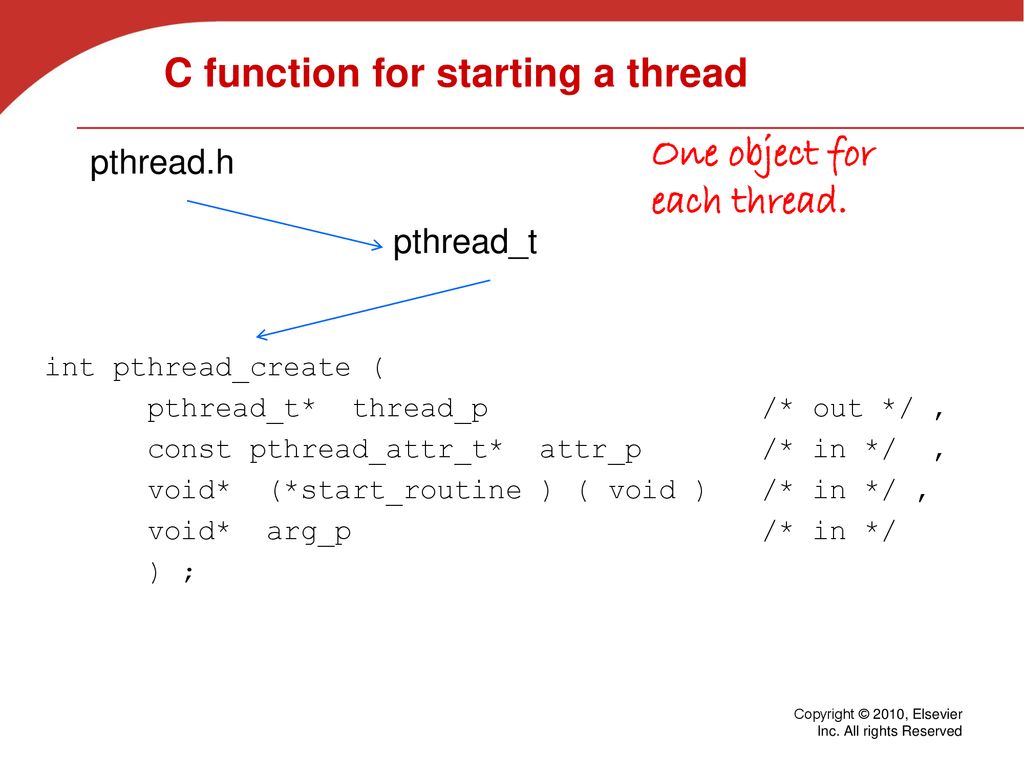

Once pthread_barrier_wait has been called by 4 threads, all the threads will continue their execution of program.Ī barrier can be destroyed using the function pthread_barrier_destroy, whose syntax is : Thus till all the four threads have not called the pthread_barrier_wait the other threads will continue to wait. Initializes the barrier "our_barrier" to wait for four threads. Pthread_barrier_init(&our_barrier,NULL,4) Thus we can make use of barriers to make the threads wait. Thus to be able to print the value of all the variables the threads have to wait until all threads have not finished assigning the values. In the example below, we create 4 threads, and each thread assigns a value to one of he global variables and then later all the threads print the value of all the four variables. Where the barrier is the same variable initialized using pthread_barrier_init.Ī thread will keep waiting till the "count" number of threads passed during init do not call the wait function on the same barrier. Int pthread_barrier_wait(pthread_barrier_t *barrier) Once a barrier in initialized, a thread can be made to wait on the barrier for other threads using the function pthread_barrier_wait whose syntax is Int pthread_barrier_init(pthread_barrier_t *restrict barrier,const pthread_barrierattr_t *restrict attr, unsigned count) īarrier: The variable used for the barrierĪttr: Attributes for the barrier, which can be set to NULL to use default attributesĬount: Number of threads which must wait call pthread_barrier_wait on this barrier before the threads can proceed further. To use a barrier we need to use variables of the type pthread_barrier_t.Ī barrier can be initialized using the function pthread_barrier_init, whose syntax is A barrier is a point where the thread is going to wait for other threads and will proceed further only when predefined number of threads reach the same barrier in their respective programs. Such operations can be implemented by adding a barrier in the thread. Thus it would be feasible that all the threads wait for each other to finish the initialization of the variables before proceeding. The 4 variables in turn might be used by all the four threads. Let us say we have four threads, each of which is going to initialize a global variable. When multiple threads are working together, it might be required that the threads wait for each other at a certain event or point in the program before proceeding ahead. The following example program demonstrates the same.Pthreads allows us to create and manage threads in a program. Therefore, they are shared by all threads. Global and static variables are stored in data segment. a.outĪfter C program to show multiple threads with global and static variablesĪs mentioned above, all threads share data segment. Following is the command used to compile the program. To compile a multithreaded program using gcc, we need to link it with the pthreads library. A call to pthread_join blocks the calling thread until the thread with identifier equal to the first argument terminates. The pthread_join() function for threads is the equivalent of wait() for processes. The fourth argument is used to pass arguments to the function, myThreadFun. The third argument is name of function to be executed for the thread to be created. If the value is NULL, then default attributes shall be used.

The second argument specifies attributes. The first argument is a pointer to thread_id which is set by this function. After declaring thread_id, we call pthread_create() function to create a thread. In main() we declare a variable called thread_id, which is of type pthread_t, which is an integer used to identify the thread in the system. Dynamic Memory Allocation in C using malloc(), calloc(), free() and realloc().Types of DNS Attacks and Tactics for Security.Address Resolution in DNS (Domain Name Server).Domain Name System (DNS) in Application Layer.How DHCP server dynamically assigns IP address to a host?.Dynamic Host Configuration Protocol (DHCP).Asynchronous Transfer Mode (ATM) in Computer Network.What are the differences between HTTP, FTP, and SMTP?.

File Transfer Protocol (FTP) in Application Layer.UDP Client Server using connect | C implementation.Socket Programming in C/C++: Handling multiple clients on server without multi threading.ISRO CS Syllabus for Scientist/Engineer Exam.ISRO CS Original Papers and Official Keys.GATE CS Original Papers and Official Keys.


 0 kommentar(er)
0 kommentar(er)
